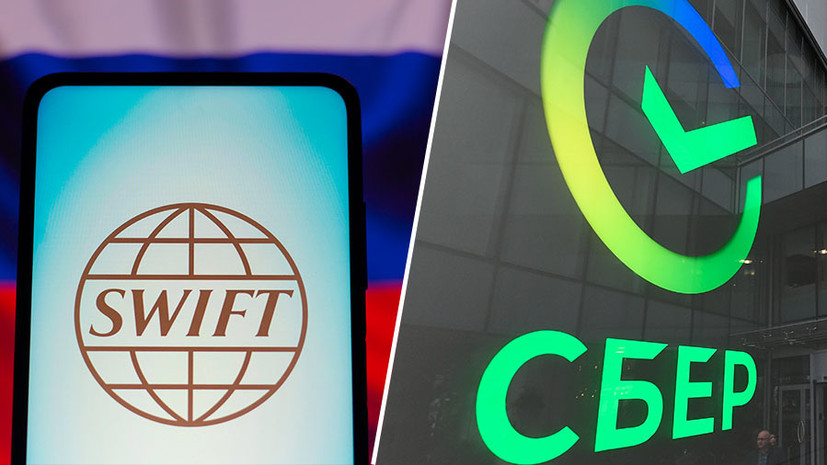Sberbank is operating as usual, the press service of the credit institution said after the European Union agreed to disconnect the bank from SWIFT as part of the sixth round of sanctions.
“Basic restrictions are already in place.
Disconnecting from SWIFT does not change the current situation in international settlements.
Domestic transactions do not depend on SWIFT and will be carried out by the bank in the standard mode.
In March, VTB, Rossiya, Otkritie, Novikombank, Promsvyazbank, Sovcombank and VEB.RF were disconnected from the international interbank system for transmitting information and making payments.
The EU took this decision as a sanction measure in response to Moscow conducting a military special operation to protect Donbass.
Package #6
The heads of state and government of the European Union agreed on the sixth package of sanctions against Russia, which includes a plan to abandon 90% of oil imports from Russia.
At the same time, a temporary exception is made for oil coming through pipelines.
“The European Council has agreed on the sixth package of sanctions.
It will establish a ban on the import of oil from Russia.
These sanctions will immediately affect 75% of Russian oil imports.
And by the end of the year, 90% of Russian oil imported to Europe will be banned, ”wrote the head of the European Council, Charles Michel, on Twitter.
Another part of the restrictions concerns Sberbank and three Russian state channels: “This package of sanctions also includes other tough measures: disconnecting the largest Russian bank Sberbank from the SWIFT system, banning three more Russian state broadcasters and imposing sanctions on those responsible for war crimes on Ukraine".
In addition, the European Union intends to provide Ukraine with €9 billion in financial assistance.
“I am pleased that the leaders reached an agreement in principle on the sixth package of sanctions tonight.
This is an important step forward.
We also agreed to work on a mechanism for providing Ukraine with a new exclusive macro-financial assistance package of up to €9 billion,” said European Commission President Ursula von der Leyen.
After the adoption of a political decision, an appropriate technical procedure should follow, the results of which will be published in the Official Journal of the EU and the sixth package of anti-Russian sanctions will come into force, TASS reports citing a representative of the European Council.
It should be noted that since March, the EU countries have begun to phase out Russian energy resources.
In early April, the EU approved the fifth package of anti-Russian sanctions, which included a ban on the import of Russian coal, as well as other solid fossil fuels from Russia from August 2022.
Also on russian.rt.com “Suicidal tendencies”: the Russian Foreign Ministry called a possible refusal of Europe from Russian oil a suicide
At the same time, the official representative of the Ministry of Foreign Affairs of the Russian Federation, Maria Zakharova, noted that the refusal of European countries from Russian oil under the sixth sanctions package would be suicidal.
“This needs to be understood.
These are suicidal tendencies.
This can be afforded by people who do not have thinking, but experts and expertise in the EU are present.
And they are well aware that this is collective suicide,” the diplomat said on Sputnik radio.
At the same time, an increase in oil prices was recorded on the London ICE exchange.
Thus, the price of Brent crude rose above $123 per barrel for the first time since March 24.
The price of WTI oil reached $118.
According to political scientist Andrey Suzdaltsev, the new EU sanctions against Russian oil turned out to be "leaky".
“My opinion is that this is an empty case, because while the tanker is moving, it is flooded with oil, in general, it is an exchange commodity, it turns out that it is sold several times - and its price changes.
There is oil of different grades, now there is mixing.
It is already difficult to say where exactly Russian oil is, so sales of Russian oil to Europe will still be ... I think that these sanctions are so full of holes, ”the expert said.
He also drew attention to the situation with Hungary, which will continue to receive oil through the Druzhba pipeline.
Thus, Hungarian Prime Minister Viktor Orban noted that the embargo imposed by the EU does not apply to the republic.
At the same time, Belgian Prime Minister Alexander De Croo said that no deadlines have yet been set for the exception that Hungary falls under, but the European Commission will analyze the situation "so that it does not last too long."
“This already makes these sanctions limited, Hungary turns out to be such a privileged member of the EU, which has access to Russian oil, the cheapest is pipeline oil.
This has already aroused the envy and indignation of Warsaw ... It is almost impossible to close the oil market completely.
This will have little effect on our oil sales.
The European Union will suffer losses, oil will rise in price.
Some enterprises, especially those owned by Russian refinery companies, will stop, so oil and oil products will be in short supply.
The situation will be more difficult for them,” Suzdaltsev concluded.

